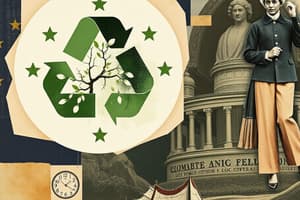Podcast
Questions and Answers
What is the main goal of the European Union's Green Transition by 2050?
What is the main goal of the European Union's Green Transition by 2050?
- To reduce dependency on renewable energy
- To become climate-neutral (correct)
- To increase pesticide usage
- To enhance fossil fuel production
How does the European Chips Act contribute to EU's digital transformation?
How does the European Chips Act contribute to EU's digital transformation?
- By fostering global semiconductor supply chains
- By limiting research in digital technologies
- By increasing semiconductor production in the EU (correct)
- By reducing investment in Horizon Europe
What does the REPowerEU plan focus on?
What does the REPowerEU plan focus on?
- Investing in clean energy technologies (correct)
- Promoting fossil fuel infrastructure
- Increasing reliance on Russian fossil fuels
- Reducing chemical usage by 10% by 2030
What is one of the key elements of the Fair Transition in the EU?
What is one of the key elements of the Fair Transition in the EU?
What legislative action does the EU take to protect journalists?
What legislative action does the EU take to protect journalists?
What was a significant outcome of the Conference on the Future of Europe?
What was a significant outcome of the Conference on the Future of Europe?
What is the purpose of the Digital Markets Act?
What is the purpose of the Digital Markets Act?
What does the EU's Rule of Law Reports assess?
What does the EU's Rule of Law Reports assess?
What was the primary purpose of creating the European Union?
What was the primary purpose of creating the European Union?
Which treaty established the European Economic Community (EEC)?
Which treaty established the European Economic Community (EEC)?
Which of the following is NOT one of the core values of the European Union?
Which of the following is NOT one of the core values of the European Union?
What significant change occurred with the Maastricht Treaty in 1992?
What significant change occurred with the Maastricht Treaty in 1992?
What does the acronym 'acquis communautaire' refer to?
What does the acronym 'acquis communautaire' refer to?
Which institution is primarily responsible for proposing EU laws?
Which institution is primarily responsible for proposing EU laws?
What role does the European Central Bank (ECB) play in the EU?
What role does the European Central Bank (ECB) play in the EU?
Which of the following is a key benefit of the Single Market in the EU?
Which of the following is a key benefit of the Single Market in the EU?
Which of the following actions is part of the EU's environmental protection efforts?
Which of the following actions is part of the EU's environmental protection efforts?
What is the significance of the Schengen Agreement established in 1995?
What is the significance of the Schengen Agreement established in 1995?
Which of the following initiatives supports youth mobility in the EU?
Which of the following initiatives supports youth mobility in the EU?
Which member countries were involved in the establishment of the ECSC in 1951?
Which member countries were involved in the establishment of the ECSC in 1951?
What is one of the EU's key global roles?
What is one of the EU's key global roles?
Flashcards
EU's Green Transition
EU's Green Transition
The EU's commitment to becoming climate-neutral by 2050, focusing on renewable energy, energy efficiency, and reducing dependency on Russian fossil fuels.
REPowerEU
REPowerEU
A plan focusing on investments in clean energy technologies like green hydrogen, microchips, and sustainable industries to accelerate the EU's green transition.
European Chips Act
European Chips Act
The EU's initiative to reduce its reliance on global semiconductor supply chains by boosting production within EU member states.
Digital Markets Act & Digital Services Act
Digital Markets Act & Digital Services Act
Signup and view all the flashcards
Horizon Europe
Horizon Europe
Signup and view all the flashcards
Fair Transition
Fair Transition
Signup and view all the flashcards
European Democracy Action Plan
European Democracy Action Plan
Signup and view all the flashcards
Rule of Law Reports
Rule of Law Reports
Signup and view all the flashcards
Why was the European Union created?
Why was the European Union created?
Signup and view all the flashcards
What is the historical context of the European Union?
What is the historical context of the European Union?
Signup and view all the flashcards
What are the core values of the European Union?
What are the core values of the European Union?
Signup and view all the flashcards
How many member states are in the European Union?
How many member states are in the European Union?
Signup and view all the flashcards
What are the benefits of EU enlargement?
What are the benefits of EU enlargement?
Signup and view all the flashcards
How does the EU's institutional framework work?
How does the EU's institutional framework work?
Signup and view all the flashcards
What are the key policy areas of the European Union?
What are the key policy areas of the European Union?
Signup and view all the flashcards
What is the Single Market?
What is the Single Market?
Signup and view all the flashcards
What is the Euro and its role?
What is the Euro and its role?
Signup and view all the flashcards
How does the EU impact the lives of its citizens?
How does the EU impact the lives of its citizens?
Signup and view all the flashcards
What is the EU's role on the global stage?
What is the EU's role on the global stage?
Signup and view all the flashcards
How does the EU ensure freedom, security, and justice?
How does the EU ensure freedom, security, and justice?
Signup and view all the flashcards
What is the role of the European Parliament?
What is the role of the European Parliament?
Signup and view all the flashcards
What is the role of the European Council?
What is the role of the European Council?
Signup and view all the flashcards
What is the role of the Council of the European Union?
What is the role of the Council of the European Union?
Signup and view all the flashcards
Study Notes
Green Transition
- EU aims for climate neutrality by 2050.
- Focuses on renewable energy, energy efficiency, and reduced Russian fossil fuel dependency.
- REPowerEU plan invests in green technologies (e.g., green hydrogen, sustainable industries).
- Reducing chemical pesticides by 50% by 2030.
- Nature restoration to combat biodiversity loss.
Digital Transition
- European Chips Act to reduce reliance on global semiconductor supply chains.
- Digital Markets Act and Digital Services Act for fair digital markets and online citizen protection.
- Increased investment in Horizon Europe (EUR 95.5 billion) research and innovation (healthcare, green tech, AI).
Fair Transition
- Social justice initiatives ensure equality during green and digital transitions.
- Reskilling workers via European Skills Agenda.
- Fostering inclusive education through the European Strategy for Universities.
- Fair labor conditions (e.g., minimum wage directive) in the gig economy.
Democracy and Media Freedom
- EU safeguards democratic values through the European Democracy Action Plan.
- Combatting disinformation, protecting elections, and strengthening media pluralism.
- Rules to protect journalists from abusive lawsuits (SLAPPs).
- Measures to enhance journalist safety online and offline.
Rule of Law
- Regular Rule of Law Reports assess member state adherence to democratic principles.
- Addresses challenges related to judiciary independence, corruption, and checks on executive power.
Citizen Participation
- Conference on the Future of Europe highlighted citizens' role.
- Over 750,000 citizens submitted ideas and discussed challenges.
- Citizens' panels will inform legislative proposals.
Equality and Inclusion
- Initiatives to combat gender-based violence, support LGBTIQ+ rights, and fight racism.
- New EU rules criminalize cyber violence and ensure equal opportunities for various groups.
European Union (EU) - Lesson 1: Why the European Union?
- EU created for peace, stability, and prosperity after WWII.
- European unity dates back to figures like Winston Churchill.
- Originated from the ECSC (European Coal and Steel Community) in 1951.
- Treaty of Rome (1957) established the EEC for economic integration.
- Core EU values: democracy, freedom, rule of law, human rights.
European Union (EU) - Lesson 2: Ten Historic Steps
- EU development through treaties and milestones.
- Schuman Declaration (1950): proposed pooling coal and steel resources.
- Treaty of Paris (1951): ECSC established.
- Treaties of Rome (1957): EEC and EURATOM creation.
- Customs Union (1968): Removal of tariffs between EEC countries.
- European Parliament (1979): First direct elections.
- Single European Act (1986): Single market launched.
- Maastricht Treaty (1992): EU and EMU creation.
- Schengen Agreement (1995): Abolished border controls.
- EU Enlargement (2004): Eastern European countries joined.
- Lisbon Treaty (2007): Modernized institutions.
European Union (EU) - Lesson 3: Enlarging and Values
- EU grew from 6 to 27 member states.
- Enlargement promotes peace, stability, and prosperity.
- Membership criteria include democratic governance, functioning markets, and acceptance of EU laws (acquis communautaire).
- Core EU values: democracy, equality, human dignity, respect for human rights.
European Union (EU) - Lesson 4: How Does the EU Work?
- EU’s institutional framework for democratic representation.
- European Parliament: directly elected by citizens, approves legislation, budgets, agreements.
- European Council: heads of state, sets general political direction.
- Council of the European Union: ministers from member states adopt laws.
- European Commission: proposes laws, manages policies, enforces law.
- Court of Justice of the EU: ensures uniform law application.
- European Central Bank (ECB): manages euro and monetary policy.
- Other bodies: Court of Auditors, consultative committees.
European Union (EU) - Lesson 5: What Does the EU Do?
- EU focuses on improving citizen lives through policies.
- Single Market: free movement of goods, services, people, capital.
- EMU: economic stability, euro management.
- Regional Policy: reduces regional disparities.
- Environmental Protection: combating climate change (Green Deal).
- Justice and Security: cooperation on crime, terrorism, asylum.
- Global Influence: leading force in trade, human rights, and diplomacy.
European Union (EU) - Lesson 6: The Single Market
- Single Market: one of EU’s greatest achievements.
- Free movement of goods, services, people, capital.
- Challenges: fair competition and worker rights protection.
European Union (EU) - Lesson 7: The Euro and Economic Stability
- Eurozone: 20 EU countries use the euro.
- European Central Bank (ECB): controls monetary policy.
- Economic Governance: coordinated policies for economic stability (Stability and Growth Pact).
European Union (EU) - Lesson 8: The EU and its Citizens
- EU works to improve citizen lives through protections, support, and equality.
- Consumer rights protection, employment laws, education programs (Erasmus+), gender equality.
European Union (EU) - Lesson 9: Europe in the World
- EU is a major global actor in trade, development aid, peacekeeping, and human rights.
European Union (EU) - Lesson 10: Freedom, Security and Justice
- EU ensures safety and rights through cooperation on crime, terrorism, human trafficking.
- Common rules on asylum and immigration.
- Protection of fundamental rights through Charter of Fundamental Rights.
European Union (EU) - Lesson 11: Europe in 2050
- EU faces challenges: climate change, technological advancements, migration, and maintaining leadership.
- Future priorities: sustainability, innovation, unity.
European Union (EU) - Lesson 12: What to Do for Europe?
- Citizens play key role in shaping Europe’s future.
- Participation in elections, debates, and shaping EU priorities.
Studying That Suits You
Use AI to generate personalized quizzes and flashcards to suit your learning preferences.




